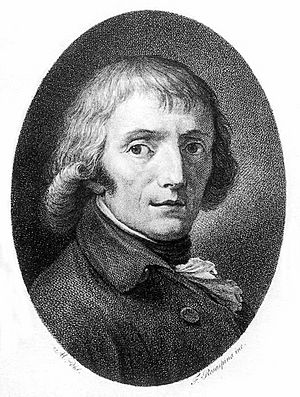Giuseppe Parini facts for kids
Quick facts for kids
Giuseppe Parini
|
|
|---|---|

Giuseppe Parini, in a lithograph by Rosaspina.
|
|
| Born | 23 May 1729 Bosisio, Brianza, Lombardy, Italy
|
| Died | 15 August 1799 (aged 70) Milan, Italy
|
| Occupation | Italian satirist and poet |
Giuseppe Parini (born May 23, 1729 – died August 15, 1799) was an Italian writer. He lived during the Age of Enlightenment, a time when new ideas about reason and science were popular. Parini was known for his satires and poetry. He often used humor to criticize society and its problems. He is a famous figure from the Neoclassic period in Italy.
Contents
About Giuseppe Parini
Giuseppe Parini was born in a small town called Bosisio in Italy. This town was later renamed Bosisio Parini in his honor. His family was not rich; his father was a small silk trader. When Giuseppe was young, his father sent him to Milan. There, he lived with his great aunt and studied at the Barnabites in the Arcimboldi Academy. To earn money, he copied old writings by hand.
In 1741, his great aunt left him some money each month. But there was a condition: he had to become a priest. So, Parini became a priest. However, he also had to work in a lawyer's office in his free time. He found the old-fashioned way of teaching religion difficult to tolerate.
Early Writings and Fame
In 1752, Parini published a small book of poems in Lugano. He used the pen name "Ripano Eupilino" for this book, called Alcune poesie. This book helped him become a member of two important groups of writers: the Accademia dei Trasformati in Milan and the Accademia dell'Arcadia in Rome.
His most famous poem is Il Giorno (The Day). This long poem gives funny advice to a young nobleman about how to spend his day. It was written in a special style of Italian blank verse, which means it didn't rhyme.
The first part of Il Giorno, called Il Mattino (Morning), came out in 1763. It quickly made Parini very popular. Two years later, the second part, Il Mezzogiorno (Midday), was published.
Later Life and Work
A powerful Austrian official in Milan, Count Karl Joseph von Firmian, helped Parini a lot. First, he made Parini the editor of the Milan Gazette, a newspaper. Then, in 1769, he gave Parini a special teaching job. Parini became a professor of literature at the Palatine School.
Later, when French forces led by Napoleon took over Milan, Parini was made a judge. But he soon left this job to go back to his writing. He wanted to finish The Day. He wrote the third part, La Sera (Evening). However, as time passed, he felt unsure about it. So, he split the third part into two: Il Vespro (Vesper) and La Notte (Night). These last two parts were not finished and were published after he died. Together, all these parts make up Il Giorno.
Parini also wrote other poems called Odi. These were written between 1757 and 1795. He was also connected to the Accademia della Crusca, which was an important Italian language academy.
Legacy
Younger poets looked up to Parini's work. They saw it as a guide for good morals and free thinking. Ugo Foscolo, another famous Italian poet, met Parini in Milan. Foscolo described Parini as a serious and respected person in his book Ultime lettere di Jacopo Ortis. He also criticized the rich city of Milan for forgetting Parini.
Giuseppe Parini passed away in August 1799 in Milan. Today, a statue of him stands in a special place in Milan's busy Piazzale Cordusio.
Libretto
Giuseppe Parini also wrote the words (called a libretto) for an opera:
- Ascanio in Alba, with music by Wolfgang Amadeus Mozart (1771).
Images for kids
See also
 In Spanish: Giuseppe Parini para niños
In Spanish: Giuseppe Parini para niños
 | Lonnie Johnson |
 | Granville Woods |
 | Lewis Howard Latimer |
 | James West |


